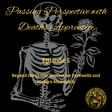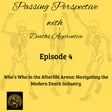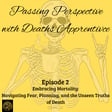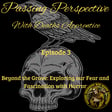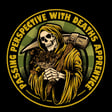Become a Creator today!Start creating today - Share your story with the world!
Start for free
00:00:00
00:00:01

Embracing the Inevitable: Conversations with Death’s Apprentice
Show Notes: Passing Perspective with Death’s Apprentice
Episode Theme: Exploring Death, Dying, and Grief Without Taboos
Overview:
In this episode of “Passing Perspective with Death’s Apprentice,” the host, an enthusiastic death advocate, delves into the often-taboo subjects of death, dying, and grief. The podcast provides a unique platform to explore cultural perspectives, funeral customs, and personal experiences with death.
Host Background:
The host shares a personal journey, detailing a lifelong curiosity and fear of death sparked by childhood losses and the absence of explanations around death.
Significant life events, including a friend’s suicide and work at a funeral home during the COVID-19 pandemic, led to profound insights and healing.
Transitioning into a role as a death doula, the host aims to guide others in planning for death and making informed decisions.
Featured Elements:
Question of the Week: Engages listeners in thought-provoking discussions about death.
Quote about Death: Offers reflective insights on mortality.
Key Discussion Points:
Philosophical exploration of why death is feared and its ubiquitous yet often-overlooked nature.
Reflections on personal experiences and how they shape one’s understanding of death.
The host’s dual passion for death advocacy and horror writing as therapeutic expressions.
Expert Contribution:
Jade Wu, PhD, discusses the psychology behind the fear of death, noting that it tends to decrease with age, health, and near-death experiences.
Emphasis on attachment styles and societal influences on perceptions of mortality.
Suggests therapy as a tool for developing healthier coping strategies.
Book Mention:
“Who Dies? Investigation Conscious Living” by Stephen Levine is recommended for understanding the interplay between attachment styles and death perspectives.
Upcoming Episodes:
Focus on effective communication about death with loved ones.
Guidance on planning for one’s own death, including practical tips and resources.
Takeaway:
This episode encourages listeners to confront and understand their fears of death by exploring personal, cultural, and philosophical perspectives, ultimately aiming to transform fear into acceptance and informed preparation.
Music from #Uppbeat
https://uppbeat.io/t/the-wayward-hearts/a-calm-hellfire
License code: TOEJOJDEKNY4JPIU
Transcript
Introduction to 'Passing Perspective'
00:00:07
Speaker
Thank you for listening to Passing Perspective with Death's Apprentice.
00:00:12
Speaker
Being that this is a podcast about death, dying, and grief, some topics discussed may be triggering for some or not suitable for younger listeners, hence the explicit rating.
00:00:26
Speaker
Listener discretion is advised.
00:00:29
Speaker
Enjoy the show.
Podcast's Focus on Death Exploration
00:00:39
Speaker
Welcome to the first episode of Passing Perspective with Des Apprentice.
00:00:44
Speaker
I am your host, Des Apprentice.
00:00:47
Speaker
You may have stumbled on this podcast because you're experiencing a loss or thinking about your own demise in some way.
00:00:54
Speaker
Maybe you're just morbidly curious about what Des Apprentice has to say.
00:00:58
Speaker
No matter why you are here, thanks for listening.
00:01:02
Speaker
Passing Perspectives is about death, dying, and grief.
00:01:07
Speaker
It is a place to learn and explore all things death with no topic taboo.
00:01:12
Speaker
I feel the best way to prepare for death is to accept it because the only sure thing about this life is that one day it will end.
00:01:21
Speaker
With each episode, I will delve into a new aspect of death, whether it be the industry itself or different cultural, religious, and historical views pertaining to death.
00:01:33
Speaker
Ever wondered about funeral customs in far-off places or which animals hold their own funerals?
00:01:40
Speaker
Well, I have and would love to share this information with you.
00:01:44
Speaker
The first few episodes, I will touch on different aspects of the death industry.
Personal Experiences and 'Death's Apprentice'
00:01:49
Speaker
all about dying expectedly and unexpectedly, who you call when someone dies, and what dying looks like.
00:01:58
Speaker
This week, being the first ever episode, I'm going to cover who is Death's Apprentice, how one becomes Death's Apprentice, and what kind of life decisions leads a person onto this path.
00:02:12
Speaker
And just some fun facts about me outside of death.
00:02:15
Speaker
Some people know they are interested in the death industry from the get-go, and some stumble into it for various reasons.
00:02:24
Speaker
I would be the latter in this equation.
00:02:26
Speaker
Nonetheless, here I am now, coming from your headphones or speaker to give you a new perspective on death, dying, and grief every week.
00:02:35
Speaker
Am I qualified to do this?
00:02:37
Speaker
Probably not.
00:02:38
Speaker
I'm not a funeral director.
00:02:40
Speaker
or crematory operator, I am not an embalmer, or a lawyer, or a doctor.
00:02:47
Speaker
I am just a girl who wants to learn about death and share what I learn with you in hopefully an enjoyable but educational way.
00:02:55
Speaker
In every episode, I will have a question of the week to answer and a quote about death to ponder until we meet again.
The Origin of 'Death's Apprentice'
00:03:04
Speaker
So what is a death's apprentice and why do I care?
00:03:41
Speaker
Who is Death Apprentice and how is that a thing?
00:03:44
Speaker
Well, it's not an official title.
00:03:46
Speaker
It kind of started as a joke when I entered the death industry.
00:03:50
Speaker
I did training as a death doula and someone pointed out that guiding people through death process made me kind of like a grim reaper, but just an apprentice.
00:04:00
Speaker
Maybe like a helper?
00:04:01
Speaker
I like to consider myself more of a death advocate, not in a way where I advocate death in a just-do-it sense, but more as a care-on, guiding you down the river Styx on your path to the underworld.
Childhood Curiosity about Death
00:04:14
Speaker
How did I get here, and why am I doing a podcast about it?
00:04:18
Speaker
You know how some people just kind of know what they want to do, and then just do the things to get there?
00:04:25
Speaker
They know from a young age that is what they want for their life, and for me, the path to working in death has not been a straightforward one.
00:04:34
Speaker
I would love to pinpoint a time long ago when I just knew that I was meant for the death industry.
00:04:41
Speaker
But that isn't the case.
00:04:43
Speaker
I will say that I've always been morbidly curious about death, but also kind of afraid of it.
00:04:51
Speaker
I started writing scary stories as a child and would even make scripts and gather all my friends in the neighborhood to act out under my carport.
00:05:00
Speaker
Alas, my early forays into theater production always ended when the sun started going down and everyone had to go home.
00:05:08
Speaker
Maybe I was just a weird kid, but I spent a lot of time reading and writing and just trying to figure things out.
00:05:15
Speaker
I took apart the very first ever computer I had, trying to figure out how it worked.
00:05:21
Speaker
I managed to put it back together too.
00:05:24
Speaker
I took a lot of things apart.
00:05:26
Speaker
My mother was in the medical field and was consistently in school until I was an adult.
00:05:32
Speaker
And once I had read every book on the bookshelf, I had moved on to the medical textbooks.
00:05:40
Speaker
I loved the Grey's Anatomy Coloring Book the most.
00:05:44
Speaker
I saw pictures of cadavers in the books and I learned all I could in a purely curious scientific sense.
00:05:52
Speaker
I was a vegetarian, so that part of life was a mystery.
00:05:56
Speaker
But I did see how fish worked when I would catch them fishing and I'm generally curious if views on death are different for people who grew up processing their own meat and being exposed to farm life from a young age.
00:06:08
Speaker
I'll look into that more.
00:06:10
Speaker
I think the concept of fish dying or being dead was completely lost on me.
Understanding Loss and Grief
00:06:15
Speaker
I experienced a personal death and loss as a child.
00:06:19
Speaker
I lost my grandparents young.
00:06:21
Speaker
First my grandpa and then my grandma a year later.
00:06:24
Speaker
I was with my grandpa when he took his final breath, but I didn't understand what it was.
00:06:31
Speaker
He was just gone, and no one really explained death and loss and grief.
00:06:37
Speaker
They had lived in a different state far away before he passed, and I'd been flown in with my siblings to see him as it was suspected he would not make it much longer.
00:06:48
Speaker
We were picked up at the airport and driven straight to the hospital.
00:06:52
Speaker
We went in one at a time to see him.
00:06:54
Speaker
I was the last because I was the youngest.
00:06:57
Speaker
I had found a cool rock the day before and had brought it with me in my pocket all the way there.
00:07:03
Speaker
I told him about it and showed it to him and said I wanted him to have it because I loved him and then he died.
00:07:09
Speaker
I was rushed out of the room and that was it.
00:07:13
Speaker
There was no funeral.
00:07:14
Speaker
He was cremated and then the adults went alone and spread his ashes and my grandpa was just gone forever.
00:07:22
Speaker
My grandpa was one of my favorite people in the world, and then he was just no longer there.
00:07:27
Speaker
When my grandma passed, I hadn't seen her since my grandpa had died.
00:07:31
Speaker
My mom went alone, and that was that.
00:07:34
Speaker
I no longer had grandparents.
00:07:38
Speaker
Death did not seem real, and I did not understand it.
00:07:43
Speaker
As an adult now who works in the death industry, I see a side to it.
00:07:50
Speaker
that I absolutely could not comprehend as a child.
00:07:55
Speaker
While I was losing my grandparents, my mom lost her parents.
00:08:00
Speaker
I can't even imagine how hard that was for her, losing her parents and still having to be a parent herself.
00:08:08
Speaker
A common theme you'll hear me say repeatedly in each episode is that death is about you, but it also isn't.
00:08:17
Speaker
After losing my grandparents, I didn't really lose anyone else like that for a long time.
00:08:23
Speaker
I lost pets and grieved their loss and I believe I understood grief to an extent, but not enough to name it.
00:08:31
Speaker
Grief and I would become very intimate later in life, about 10 years ago to be exact.
00:08:37
Speaker
If I had to pinpoint when it began, this was it.
00:08:41
Speaker
It began with grief.
Coping with Deep Grief
00:08:43
Speaker
I lost my best friend of three decades to suicide.
00:08:47
Speaker
I did not attend her funeral, and the last time we spoke just a week prior was a fight.
00:08:53
Speaker
I do know the last thing I said to her was that I loved her, and I always hoped she knew that when she died.
00:09:00
Speaker
grief hit me full on and I had no idea how to manage it.
00:09:04
Speaker
I became severely depressed, which turned into suicidal thoughts and ideation.
00:09:10
Speaker
I spent years like this.
00:09:11
Speaker
I got so far into it that I had put everything in writing and made my own death binder.
00:09:18
Speaker
I woke up every morning with a plan and by the end of the day talked myself out of it one way or another, thinking tomorrow would be the day.
00:09:26
Speaker
It was so far beyond depression, it was just a when, not an if.
00:09:32
Speaker
Then, everything changed when the Fire Nation attacked.
00:09:37
Speaker
Just kidding, it wasn't the Fire Nation, but it was an event.
00:09:41
Speaker
One I will touch on in the episode about grief, but it was big enough that instead of it being me who took myself out, my whole existence crashed in one day.
00:09:52
Speaker
One hour, one minute, one moment.
00:09:56
Speaker
It wasn't death, it was maybe a soul death.
00:10:00
Speaker
The very essence of me turned into mush while my body remained whole.
00:10:06
Speaker
I metaphorically wrapped myself in a cocoon, although in my case it was a steel reinforced wall that I metaphorically wrapped myself in.
00:10:15
Speaker
And I very slowly healed and rebuilt myself like some goddamn butterfly.
00:10:20
Speaker
It was during this rebuilding that I found the death industry.
Journey into the Death Industry
00:10:23
Speaker
When I first started working in the funeral home, I was grieving myself and everything I had lost, mainly the old me who turned a mush while simultaneously trying to figure out who I would become.
00:10:36
Speaker
I was not a fan of the funeral home at first.
00:10:39
Speaker
I was in desperate need of a job.
00:10:43
Speaker
I was working at my dream job and was laid off while having bad COVID.
00:10:48
Speaker
It was winter, I was alone and still trying to figure out who I was now.
00:10:52
Speaker
And I couldn't breathe, and after all these years talking myself out of suicide, here I was going to die from freaking COVID, cold and alone and jobless as a pile of mush not even knowing who I was anymore.
00:11:05
Speaker
That did not happen.
00:11:06
Speaker
Instead, my fever broke and I started getting better, and I started looking for a job.
00:11:11
Speaker
By the time I was able to not be contagious, I had two job interviews.
00:11:16
Speaker
One was yet another dream job working as a reporter at the local small town newspaper covering school board meetings and things, or a funeral home.
00:11:27
Speaker
I didn't even want to go to the funeral home interview, but the pay was enticing and I needed the money.
00:11:33
Speaker
It was the weirdest job interview I have ever gone to.
00:11:38
Speaker
And they even asked if I had ever seen a dead body.
00:11:42
Speaker
I got offered both jobs in a couple of days, but sadly the newspaper did not pay enough to pay rent.
00:11:49
Speaker
I tried to talk about a dying industry, right?
00:11:52
Speaker
I tried to talk the editor into letting it just be a side gig, but alas, it was a no-go.
00:11:57
Speaker
And the funeral home it was.
00:12:00
Speaker
I was thrown in and within the first few weeks I was fully into the world of death, dead bodies and all, which not only did I have to see, I had to touch as well.
00:12:10
Speaker
Everything was a new experience and something new I would learn about the industry and about myself.
00:12:17
Speaker
Through others grief I learned about my own and by facing death in this way, I learned to accept it as part of life, but also to cherish the life I have.
00:12:28
Speaker
I'm not lying when I say it was like something from a fairy tale movie where something just clicked into place and I knew I was home and this is where I belonged.
00:12:37
Speaker
And I will always consider those I worked there with as family.
00:12:41
Speaker
I transitioned into death doula work and working with those who were grieving.
00:12:47
Speaker
I wanted to help people plan and prepare for their own and their loved ones deaths.
00:12:52
Speaker
And I wanted to talk about death.
00:12:54
Speaker
I wanted to advocate for the choices you get to make because you don't always have the choices of when you go.
00:13:01
Speaker
A big reason I bring you Passing Perspective every week is to give you the information you need to make the most informed decisions about the deaths you may encounter, including your own.
00:13:14
Speaker
So is it all death all the time?
00:13:17
Speaker
No.
Hobbies and Personal Interests
00:13:19
Speaker
Aside from podcasting and being a death advocate, I write horror stories because if you ever watched Scooby-Doo as a kid, you know the real monsters are always human.
00:13:29
Speaker
And I love exploring why people are the way they are.
00:13:32
Speaker
I use writing as a form of therapy to work those fears out and anxieties that keep me up at night.
00:13:40
Speaker
I enjoy a good mystery as well and I've been expanding into writing them.
00:13:45
Speaker
I sometimes go through phases where I watch a lot of TV, mostly documentaries.
00:13:50
Speaker
Every once in a while, a good movie or TV show will have me thinking about things I hadn't before, or really intrigue me.
00:13:58
Speaker
In my free time, when I'm not writing, you can find me working in my garden, or in the woods hunting for mushrooms, hiking, kayaking, and just generally being outside, enjoying the beautiful world we get to live in.
00:14:13
Speaker
I enjoy cooking and eating food from all over the world and baking bread.
00:14:17
Speaker
I love fine wine and good conversation.
00:14:21
Speaker
I love to be surrounded by life and enjoying nature in all its glory because a sweet isn't as sweet without the sour and there is nothing quite like death to make you appreciate life.
Philosophical Question: Fear of Death
00:15:05
Speaker
This portion of the show is to inform and even get you thinking about things that maybe you hadn't before.
00:15:12
Speaker
For the very first question of the week, I'm going to ask my own question.
00:15:16
Speaker
This week's question is something that I've looked within myself to answer as well as outside sources.
00:15:23
Speaker
And as I discuss it, you too should think about your answers for it.
00:15:27
Speaker
This is less of an informational question and more philosophical.
00:15:32
Speaker
What is it about death that scares us, that makes us not want to think about it or discuss it?
00:15:39
Speaker
This was a question I never thought to ask, and I just didn't think about it.
00:15:42
Speaker
Death rarely affected me on a daily basis, and it was easy to ignore.
00:15:47
Speaker
The thing is though that really it wasn't.
00:15:50
Speaker
Going through my day to day life with general anxiety, I faced that fear every day and just didn't talk about it.
00:15:58
Speaker
No one around me was either.
00:16:01
Speaker
When someone did die, it was just done and you never really spoke about it.
00:16:05
Speaker
And let's face it, death is everywhere, all the time.
00:16:09
Speaker
According to the World Death Clock, it is estimated that there are over 56 million deaths occurring annually, which translates to approximately 4.6 million deaths monthly, 150,000 daily, 6,000 hourly, 106 every minute, and nearly 2 deaths every second.
00:16:30
Speaker
This tool offers a stark visualization of life's transience.
00:16:34
Speaker
With all that death, all the time, it is no doubt that there are a wide range of views about death.
00:16:40
Speaker
And just like the people who live, death views, culture, and customs have evolved like the ever-changing fashion industry.
00:16:47
Speaker
At this point, I'm not going to go too far into all of this.
00:16:51
Speaker
More episodes to come, right?
00:16:53
Speaker
However, I came across an article on Psychology Today that breaks down more current reasons for a fear of death.
00:17:02
Speaker
And I will link the article in the show notes.
00:17:07
Speaker
The article by Jade Wu, PhD, discusses the different reasons people may be scared of death and some ways to work on that fear.
00:17:16
Speaker
Some of the things mentioned in the article are that as you age, you fear death less, and that religion sometimes plays a role in that fear.
00:17:25
Speaker
The better health you have and the near-death experiences you have had also tend to cause you to fear it less.
00:17:32
Speaker
This makes a lot of sense, but the last reason kind of hit home from a grief standpoint.
00:17:38
Speaker
The article says...
00:17:39
Speaker
Your attachment style plays a big part in how you view death.
00:17:44
Speaker
Those who have more secure attachments tend to fear death less.
00:17:48
Speaker
If you're not familiar with attachment styles, attachment theory is based on the origins of attachment theory, co-written by John Bowlby, I may have said that wrong, and Mary Ainsworth.
00:18:01
Speaker
And its history begins in the 1930s with observation of infants separated from their parents.
00:18:08
Speaker
I'm hoping that informed consent was involved, but it was the 1930s, so it could have been more like an Albert and the Light Bunny situation.
00:18:18
Speaker
From this theory stemmed four main attachment styles.
00:18:21
Speaker
These are securely attached, anxious preoccupied, dismissive avoidant, and fearful avoidant.
00:18:27
Speaker
Each type stems from the developmental attachment to the parents and basically develops from the type of parenting they receive.
00:18:36
Speaker
If you would like to read more about attachment theory, I will link some further resources in the show notes.
00:18:42
Speaker
I found this reason for fear of death particularly interesting because, well, I did have a lot of coursework in school and developmental psychology, and I'm personally of the opinion that every step of our path from birth through adolescence into adulthood plays a huge role in how our adulthood goes.
00:19:03
Speaker
The article stated that having a secure attachment style causes a person to have less of a fear of death.
00:19:11
Speaker
Secure attachment is exactly what you would guess.
00:19:14
Speaker
This attachment is secure.
00:19:16
Speaker
The person is not overly attached, but not unattached.
00:19:21
Speaker
It's hard to explain because I myself am not a secure attachment style.
00:19:25
Speaker
from though it makes a lot of sense these people are secure they are comfortable with themselves and not afraid of losing people they don't try to control things like their friend you have or maybe it's you this person is okay being alone or in a relationship generally ends things well and apparently accepts loss
00:19:47
Speaker
The other attachment styles, anxious, dismissive, and fearful, avoidance, kind of speak for themselves, personally.
00:19:55
Speaker
And this is just going by my own personal experiences, but I believe more people are one of these than secure.
00:20:02
Speaker
The 80s kind of messed us all up, didn't it?
00:20:05
Speaker
If I connect my own dots, it makes complete sense that most people, depending on culture and religion, are scared of death and dying.
00:20:12
Speaker
Personally, in the U.S., I see many prevalences of disconnect between death
00:20:17
Speaker
And death.
00:20:19
Speaker
Like, if it's far away from us personally, it's nothing.
00:20:22
Speaker
Yet, when it hits home, we must face it.
00:20:25
Speaker
We're faced with violence and war and just constant death in the media and games and television, and we don't think of those grieving and are more inconvenienced by psychological issues than convenienced by them.
00:20:38
Speaker
That is a whole different topic.
00:20:41
Speaker
I know I went all over the place with that answer and to sum it up, there are quite a few factors that go into how you view death around you and that which is personal to you.
00:20:51
Speaker
This is definitely a topic to speak to your therapist about because one should have a healthy fear of death.
00:20:58
Speaker
You should look into what your attachment style is, especially if it is not secure.
00:21:02
Speaker
You're probably not a secure attachment style, just saying.
00:21:05
Speaker
And you may find yourself becoming a healthier human being in general, along with
00:21:10
Speaker
The healthier view of death you will develop as you live and grow.
Reflections on Death Quotes
00:21:14
Speaker
For the next portion, it is a quote of the week that I would like to share with you.
00:21:20
Speaker
And this is by an author.
00:21:23
Speaker
His name is Stephen Levine.
00:21:25
Speaker
And it's from his book,
00:21:28
Speaker
called Who Dies?
00:21:29
Speaker
Investigation Conscious Living.
00:21:32
Speaker
You can find that at any bookseller nearest you.
00:21:35
Speaker
And I actually am going to take two quotes from this.
00:21:39
Speaker
I haven't read the book, but these quotes kind of spoke to me.
00:21:43
Speaker
The first one is, to the degree we identify with the body, as me or mine, we fear death.
00:21:52
Speaker
And the second quote to ponder until the next episode is, if we examine our fear of death, we see in it a fear of the moment to follow, over which we have no control.
00:22:06
Speaker
In it is a fear of impermanence itself, of the next unknown changing moment in our life.
Episode Conclusion and Preview
00:22:46
Speaker
Thank you for listening to the first episode of Passing Perspective.
00:22:51
Speaker
I hope you've enjoyed learning about Death's Apprentice and maybe you've already started thinking about your own relationship with death and dying.
00:22:59
Speaker
I hope for all of you to start thinking about your own views on death and where your own fears are stemming from.
00:23:05
Speaker
I would love to hear your thoughts or opinions on fears of death or your very own experiences with it.
00:23:12
Speaker
And I might even share your stories on the show.
00:23:15
Speaker
You can also leave questions you want answered and they may just be addressed on the show.
00:23:21
Speaker
You can visit Passing Perspectives on the web at www.passingperspective.com where you can find show notes, resources, and general information about this show.
00:23:36
Speaker
You can also interact on Facebook at Passing Perspectives.
00:23:40
Speaker
and Instagram at Passing Perspective Podcast.
00:23:44
Speaker
Join us for the next episode, which will be all about talking about death with your loved ones and planning for your own death, the steps to take, some helpful communication tips, and where to begin researching, what the possibilities are, and how to go about making it happen.
00:24:03
Speaker
You can find Passing Perspective with Death's Apprentice Podcast on all your favorite streaming services.
00:24:10
Speaker
Until we meet again, parting is such sweet sorrow.
00:24:14
Speaker
Your friend, Death's Apprentice.
00:24:26
Speaker
Thank you for listening to this episode of Passing Perspective with Des Apprentice.
00:24:32
Speaker
All episodes are written, hosted, and produced by Des Apprentice.
00:24:38
Speaker
Music is a calm hellfire by The Wayward Hearts.
00:24:42
Speaker
Licensing by Upbeat.
00:24:46
Speaker
Tune in for next week.
00:24:47
Speaker
See you then.
00:25:43
Speaker
Bye.
00:26:22
Speaker
The End
